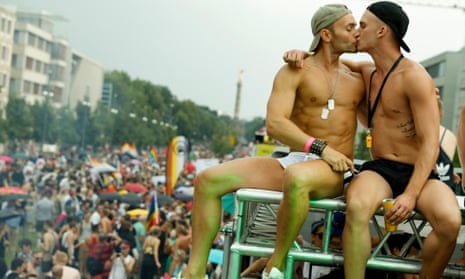Fifty years after homosexuality was decriminalised in England and Wales, 72 other countries and territories worldwide continue to criminalise same-sex relationships, including 45 in which sexual relationships between women are outlawed.
There are eight countries in which homosexuality can result in a death penalty, and dozens more in which homosexual acts can result in a prison sentence, according to an annual report by the International Lesbian, Gay, Bisexual, Trans and Intersex Association (ILGA).
Southern and east Africa, the Middle East and south Asia persist with the most draconian approaches. Western Europe and the western hemisphere are the most tolerant.
But Britain was by no means a frontrunner when it moved 50 years ago to partly decriminalise homosexuality. Some 20 other countries had already led the way, including France, Belgium, the Netherlands, Brazil and Argentina, all of whom had legalised it well before 1900.
In Iran, Sudan, Saudi Arabia and Yemen, homosexuality is still punishable by death, under sharia law. The same applies in parts of Somalia and northern Nigeria. In two other countries – Syria and Iraq – the death penalty is carried out by non-state actors, including Islamic State.
The report notes that, although the potential exists for a death penalty to be handed down under sharia courts in at least five other countries – Pakistan, Afghanistan, the UAE, Qatar and Mauritania – there is no evidence suggesting that it has been implemented for consensual same-sex acts between adults in private.
Same-sex relations – which are variously criminalised under laws covering sodomy, buggery and “acts against nature” among others – could lead to a prison sentence in 71 states in all.
However, this number excludes Egypt, where same-sex relations are technically legal but are vigorously pursued and where hundreds of people are reported to be detained on morality grounds.
Altogether, more than 120 countries have decriminalised homosexuality. But some still cannot be described as liberal. Russia, for example, has recently introduced laws banning the promotion of homosexuality. Russia was recently rebuked by the European court of human rights for a 2013 law banning the spread of “propaganda of non-traditional sexual relations” among minors.
A co-author of the ILGA report, Aengus Carroll, said it remained the case that there was “no country in the world where LGBT people are safe from discrimination, stigmatisation or violence”.
“Legislative change is slow enough in coming, but societal attitudes, particularly those that may evoke taboo, are painstakingly slow,” he said.
However, he pointed to some positive developments, in countries including Botswana, Kenya, Zimbabwe and Tunisia, where advocates have recently won court cases affirming the right to form organisations to lobby for rights.
There have also been “amazing strides” on sexual orientation and gender identity issues around the world.
A parliamentary vote in Germany will lead to the legalisation of same-sex marriage later this year; marriage equality in Malta will bring to 24 the number of states allowing gay marriage. A similar number of states offer civil partnership recognition.
At the time of publication of the ILGA report, there were 26 countries that allowed for joint adoption for same-sex couples and 27 in which same-sex second parent adoption – where a same-sex parent can legally become a step-parent to his or her partner’s child – was in place.
A spokesman for the LGBT charity Stonewall said that, while it was important to remember how far the UK had come on LGBT rights since the 1967 Sexual Offences Act, many challenges remained.
“Same-sex relations are illegal in 72 countries, and punishable by death in eight. We all have a part to play in ensuring all LGBT people are accepted without exception and all we can hope is that, in 50 more years, we will have lots more progress to look back on,” said Matt Horwood.
“Trans people still face a number of legal barriers and LGBT people as a whole continue to face discrimination in their daily lives. LGBT people can find themselves excluded, or face verbal and physical abuse, whether at work, at school, in sport, in faith or within local communities.”










